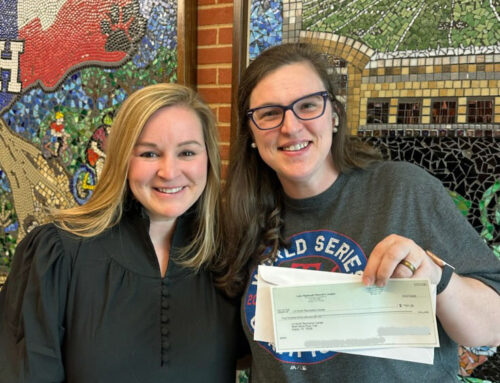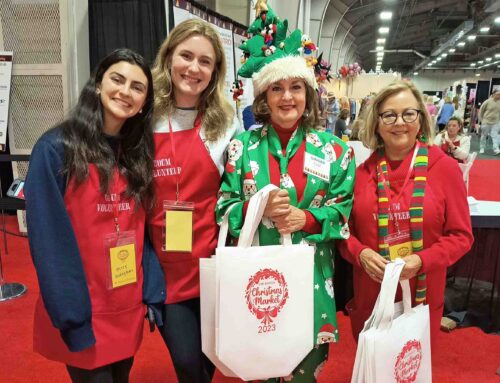Funny, but it seems like Thanksgiving is an afterthought for many families who visit area food pantries this time of year. Turkey and dressing are nice – and so are macaroni and cheese, a sack of potatoes, shoes for the kids, and a bus pass or $5 for gas.
But with a little help from their Lake Highlands neighbors, some less fortunate people might re-discover the holiday spirit this November.
“We used to have Thanksgiving, but it’s too much work now,” says Hamer Brown, a 74-year-old retiree who visited the Network of Community Ministries pantry in Northlake Shopping Center to get groceries for himself and wife Iva Mae.
“Thanksgiving doesn’t mean anything anymore. It used to years ago when I was working and had the money.”
Brown recites a litany of problems – malaria from his service in the Pacific, emphysema, skin cancer and troubles with the Veterans Administration – that sap his energy these days.
He explains that he and Iva Mae, married 45 years, moved to an apartment on Northwest Highway when they couldn’t take care of their house anymore.
Finally, Brown stops himself and says: “That’s about all we do now, talk about doctors and try to get medicine.”
But he brightens when told that he might be able to get a Thanksgiving turkey at the pantry.
“I’ll definitely come back for that,” Brown says.
“If we have some turkeys, we’ll be able to distribute them to families that can use them at Thanksgiving,” says Shiela Wilson, associate director of the Network pantry.
“That depends on what the community blesses us with. But we can do our best to make sure no child goes hungry.”
All of the half-dozen area pantries hope to distribute turkey, ham and the trimmings this Thanksgiving. But each year, agencies such as the Network of Community Ministries and the Highland Oaks Church of Christ’s “Caring and Sharing” office in Lake Highlands and the White Rock Center of Hope on Garland Road send many people away without traditional holiday meals.
Instead, the pantries fill some of their clients’ stomachs with bread, rice and canned beef stew, but shouldn’t every family be able to celebrate this holiday with a traditional meal?
“I’ll plan to have a big Thanksgiving, if I can,” says Yvonne Green, who visited the White Rock Center on Garland Road with her 5-year-old son, Oliver Wendell Green.
“My husband has family, and I have a sister in Fort Worth who I’d like to invite. Thanksgiving is very important. That’s the way I’ve been raised. My kids know when it’s Thanksgiving and they always ask, ‘Where’s the turkey?’”
The Network is feeling a crunch due to the poor economy and relief supplies diverted to hurricane victims, volunteers say. But they’re confident the holiday season will bring new donations of food and clothing.
Wilson says the Network began in 1986 in Richardson to serve needy families ignored by the community. The Network opened its Northlake office in October 1989 for similar reasons.
“People in Lake Highlands do not realize that a large census tract in the community is at risk and targeted for hunger,” she says. In the region encompassed by LBJ Expressway, Skillman Road and Forest Lane are “single-parent families living right on the edge.
“Jobs are such today that if you miss work, you don’t get paid,” Wilson says. “A child’s illness can be a catastrophic event for a family.
“The old image of a job where you work for a company for a very long time and receive sick pay and benefits is past.”
Henry “Steve” Stevenson, director of the Wilkinson Center at Bryan and Munger streets, says: “The most startling aspect of this job is the reality that if the family situation turns bad, how quickly you can move from the fringes of Highland Park to a tenement in East Dallas.
“We’re all closer to being on the street than we think right now because the economic picture is so bleak.”
But bad times also bring good in the form of donations and volunteers ready to help distribute clothes or food or to interview clients, says Debbie Batson, director of the White Rock Center of Hope.
“People are scared. The economy is starting to affect the middle class more, and that brings it all home,” she says. “Everybody knows somebody who has gone through a layoff or is otherwise affected by the economy. People think, ‘It could be me.’”
Ralph Sand runs a custom video recording and editing business in Murphy, Texas, with his wife Jan (“I’m also a Ph.D. chemist, if that’s of any interest to you,” he says), who acquired a passion for volunteering. She is a hospital visitor and museum docent and volunteers with Ralph at the Catherine the Great exhibit in Fair Park.
“Jan had to go through an 18-week course at First Baptist Church to become an interviewer for the Network,” Sand says.
“I came down here to see what she was doing, and now I’m hooked. I get a lot of satisfaction out of volunteering. It’s a good way to help people.”
The Wilkinson Center also thrives with the help of dedicated volunteers. Pearl Douillette has worked at the basement pantry for more than six years, distributing food three days a week to the largely minority clients who come in from the surrounding lower East Dallas community.
A small, leathery native of Concord, N.H., with an accent to match, Douillette briskly fills paper bags and boxes with food and totes the heavy packages into position for the needy families and individuals who will soon appear at her door.
The Center, located in space donated by Munger Place United Methodist Church, feeds the first 50 people who show up asking for food each day. Interviewers determine whether applicants qualify for additional financial assistance, then send them downstairs to the pantry.
Douillette recites the food allotments from memory: “Eight pounds for one person, 10 pounds for two, 14 for three, 18 for four, 24 pounds for five people.
“But they’ve got to go out and look for themselves, too. This is for emergencies, not to depend on month after month,” she says.
“What brought me to Texas? I married a damn Texan,” she says. “That didn’t last long, though. He drank too much.” Douillette retired after 20 years at J.C. Penney and says, “I didn’t want to stay at home all day. I have a neighbor in my apartment building who just sits and drinks. You talk about a waste.”
“I say, ‘George, you could come on down and help me at the pantry.’ He says, ‘No, I just can’t.’ I’d go crazy if I sat in my apartment seven days a week.”
The pantry’s clients begin to arrive, men and women and children, some poorly fed and distracted-looking, others all business as they pick through boxes of fruits and vegetables on tables in the hallway.
Whatever indignities that have befallen him haven’t diminished Eugene Brokeshoulder’s outlook on life. And though he approaches Thanksgiving from a different perspective than the grateful immigrants who first celebrated the holiday, it’s still a time for him to visit his sons and grandchildren in Oklahoma.
“I’m a full-blooded American Indian,” says Brokeshoulder, 53. He just started work as a maintenance man at the Federal Reserve Bank and needed help until he receives his first paycheck.
“I’ve worked in hotels, convenience stores, as a store clerk, everything that comes around. I’m going to get my social security when I’m 60, go home to Oklahoma and spend time with my grandkids,” he says.
“I couldn’t do without my grandkids. If I’ve got 10 or 15 dollars in my pocket, I give it to them. I tell my children, if I’m gone with the Lord, you keep on with them.
“They all have good jobs and are doing fine, but I tell them, there’s going to be some good times and there’s going to be some bad times. You’re going to have a taste of it like I did…”
He doesn’t quite finish the thought, but Brokeshoulder is referring to the ideals of perseverance, hope and sharing that make Thanksgiving meaningful for people and their families.





